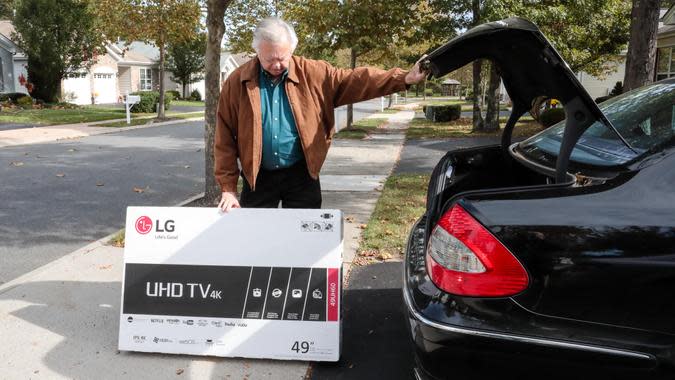15 Retirement Mistakes and Why They’ll Shrink Your Nest Egg

The decision to retire affects your day-to-day life in many ways, both personally and financially. Your retirement years should be enjoyable, but it's important to make sure your finances are in order so that you can truly make the most of your newfound freedom.
See: States Where Your Retirement Will Cost Less Than $45,000 a Year
Read More: Jaw-Dropping Stats About the State of Retirement in America
While you're planning all the fun things you can do with your free time, it's important to also take note of what not to do in retirement, as certain mistakes can derail your retirement plans.
Last updated: Oct. 15, 2021

Mistake 1: Taking Social Security Too Early
You can start receiving your Social Security retirement benefit as early as age 62, or as late as age 70. It might be tempting to collect as soon as you are able, but keep in mind that when you start collecting affects your monthly benefit amount for the rest of your life.
Read: 27 Ugly Truths About Retirement

Why This Is a Mistake
While you might be eligible to start taking your benefits at age 62, waiting until your full retirement age -- which ranges from 65 to 67, depending on the year you were born -- results in a monthly payment that is about 30% higher than you would receive at age 62. If you can wait until age 70, your benefit will max out and be another 32% higher than at your full retirement age.
Additionally, if you take Social Security before your full retirement age, any income earned above $18,960 will result in a reduction of $1 of your benefit for every $2 of income above that limit.
"Don't start Social Security as soon as you are eligible," said certified financial planner Eric McClain of McClain Lovejoy. "It might make sense to delay, perhaps even draw on your other assets first."
Unless you are physically incapable of working, it's best to continue to work for as long as possible to max out your Social Security benefits.
Check Out: Here’s How To Retire Early and Quit the Daily Grind

Mistake 2: Not Investing Aggressively Enough
There could be a tendency to not actively invest, or even cash out on all current investments once you reach retirement age. But this isn't a wise financial decision.
The Future: A Troubling Look at the State of Retirement in 2021

Why This Is a Mistake
Retirement is not the end of your financial journey; in many ways, it is only the beginning. According to the Society of Actuaries (via Vanguard):
"A 65-year-old man has a 41% chance of living to age 85 and a 20% chance of living to age 90. A 65-year-old woman has a 53% chance of living to age 85 and a 32% chance of living to age 90. If the man and woman are married, the chance that at least one of them will live to any given age is increased."
Because your retirement is not the end of your financial life, you still need to invest a portion of your retirement nest egg for growth. What percentage and how your overall portfolio should be allocated will vary based on factors unique to each retiree's situation. Being too conservative can result in outliving your money in retirement.
No matter what your unique situation is, the key to a good retirement investment strategy is diversification, which means investing in all asset classes: stocks, bonds, real estate trusts and more.

Mistake 3: Ignoring the Impact of Inflation
The 2019 inflation rate is 1.7%, and it's projected to range from 2.73% to 2.23% over the next few years, according to Statista. Although the inflation rate might seem minimal, it still affects how far your dollar will go. This is especially true for money held in fixed savings accounts, which unlike money in certain investments, will lose value over time.
Read: 50 Things Every 50-Something Should Know About Retirement

Why This Is a Mistake
At a somewhat normal rate of 3% inflation, your purchasing power will be cut in half in 24 years. Given the previous statistics, and the fact that we are living longer, inflation is every retiree's worst enemy.
What can you do to mitigate the impact of inflation on your retirement finances?
– Invest aggressively enough to stay ahead of inflation.
– Plan conservatively for inflation while anticipating higher healthcare costs.
– Be prepared to adjust spending and retirement account withdrawals.

Mistake 4: Not Meeting With a Financial Planner for Retirement Help
Many people are ill-prepared for retirement but don't want to take the time to meet with a financial advisor to find out how to improve their financial readiness.

Why This Is a Mistake
Engaging the help of a qualified, fee-only financial advisor for retirement advice can help both pre-retirees and those already retired stay on track.
You only get one shot at retirement, so don't let your pride or a reluctance to spend the money on an advisor deter you from getting the help you need.
Meet with a financial planning expert to get a detached third-party view of your situation. He or she can help you design a retirement income strategy based on your anticipated resources, including Social Security, any pensions you might have, your tax-deferred retirement accounts and more.
If you don't know exactly what your life will look like in retirement, it's best to think through several different scenarios, such as keeping your home or relocating, and figure out with your advisor how to approach your finances no matter what path you end up taking.

Mistake 5: Not Planning for Healthcare Costs
When thinking about living costs you'll need to cover in retirement, including housing and daily necessities, healthcare costs could slip through the cracks. This is especially true if you don't have any current health problems that require additional spending.
"The best medicine is to make sure your retirement plan takes into account this large line item -- and to find ways to cut future costs or develop income streams to pay expenses," according to Kiplinger's Retirement Report.

Why This Is a Mistake
A couple retiring in 2019 would need $285,000 to cover healthcare costs in retirement, according to a study by Fidelity. This is a significant amount of money, even for someone with a $1 million-plus nest egg.
For those still working and who have access to one, a health savings account (HSA) can be a great way to supplement retirement savings and build up a nest egg with pre-tax money that can be tapped tax-free in retirement for qualified medical expenses.
For those who are already retired, make sure your savings can cover healthcare costs outside of those that will be covered by Medicare. Keep in mind that you need savings to cover both short-term medical expenses and long-term care.

Mistake 6: Not Creating a Retirement Budget
More than 40% of Americans have less than $10,000 put away for retirement, a GOBankingRates study found. The percentage was not much lower for soon-to-be-retiring baby boomers, with almost 33% saying they have less than $10,000 saved for retirement. Even if you feel comfortable with your nest egg, you should sit down and calculate how long your savings actually will last.

Why This Is a Mistake
No matter how confident you are that you are in a good place financially to retire, it's important to actually take time to do the math to make sure that everything will really add up.
A great first step for those approaching retirement is to establish a budget for desired retirement lifestyles. Where will you live? What will you do? How much will it take to fund your lifestyle each month? Do you have the financial resources to support this lifestyle?
If not, you will need to rethink your retirement. Perhaps you need to go back to work or scale back on activities. A budget helps you get a handle on where you are and if you will be fine financially in retirement.

Mistake 7: Failing To Have a Retirement Income Strategy
Many retirees have multiple revenue streams in retirement, but they might not think ahead about the best ways to put each of those income sources to good use.

Why This Is a Mistake
One of the most complex aspects of retirement is managing distributions from various retirement accounts, along with other sources, such as a pension or Social Security.
You need to decide: Which accounts should you tap and in what order? What are the tax ramifications? How will your income affect Medicare and other benefits? The ramifications of not having a retirement income strategy can be catastrophic, so protect yourself by making plans now.
Stay Safe: How To Protect Your Retirement Savings During the Coronavirus

Mistake 8: Not Factoring In the Impact of Taxes on Retirement
Once you're no longer earning a paycheck from which taxes are deducted automatically, it can be easy to forget about all the taxes you still have to pay in retirement, from income tax on retirement revenue to property taxes. You also want to make sure you're taking advantage of any ways to cut down your taxes in retirement.

Why This Is a Mistake
Taxes can be a huge factor in retirement. Withdrawals from retirement accounts, such as IRAs and 401(k)s, are usually subject to full taxation at ordinary income rates. Social Security also can be taxable depending upon your income. Furthermore, these withdrawals are added to any other income you earn.
Pension payments are usually taxable, but some pensions might be exempt from state income taxes.
Annuities are taxable, too. Distributions from non-qualified annuities (purchased outside of an IRA or retirement account) will be taxed to the extent that the money being distributed is not the principal amount you contributed.
A Roth IRA is not subject to taxes if all rules are followed, however, and a Roth 401(k) can be rolled into a Roth IRA to receive similar treatment.
The bottom line is that retirees must take taxes into account. In some cases, there will be options as to where to take money from, and it is important that tax considerations be taken into account with all such decisions.

Mistake 9: Selling a Home Too Soon
If your largest asset is your home, you might be eager to sell your home as soon as you retire so that you can put the money toward your nest egg.

Why This Is a Mistake
It's important to consider the housing market where you live before putting your home up for sale. It makes sense to sell your home if you live in a city where home prices are skyrocketing, but it is not a wise financial decision if you live in a city where home prices are plummeting. A GOBankingRates study found that in a handful of cities in the South and Southeast, and particularly in Texas, home prices had decreased $5,000 or more year-over-year.
If you live in an area where home values are falling, consider using your current property to earn additional income, rather than selling it right away. Rent your house to tenants for a year while you try out living in a new area. That accomplishes two things. That solution gives you a chance to try a different area to see if you might enjoy living there. Plus, you gain enough income to pay your housing expenses while giving the real estate market a chance to rebound in your home area.

Mistake 10: Going on a Spending Spree
It's easy to get caught up in a spending spree once you retire, whether you end up splurging on vacations, golf memberships, home renovations or some other luxury that you want to be able to enjoy with your new free time.

Why This Is a Mistake
Spending money you haven't budgeted for could eat away at your retirement savings quicker than anticipated.
Include "fun" expenses such as affordable vacations and money to pursue hobbies into your long-term retirement budget. If you find that a hobby or vacation requires more funds than you initially allocated for it, think of ways to balance out your spending by cutting costs elsewhere, such as going out to eat less the next month. Or, consider selling off an asset you no longer need.

Mistake 11: Not Taking Advantage of Senior Discounts
Numerous places from theme parks to movie theaters to restaurants offer discounts for seniors. If you're a member of AARP or AMAC, that discount can get even bigger.
However, many people don't think to take advantage of senior discounts and "early bird specials," either because they don't know it's an option or as a point of pride.

Why This Is a Mistake
Simply put, not taking a discount means you're leaving money on the table. If the option is available for the taking, you should jump at it. You might find that you have extra money left over to go toward other things if you do.
If you're unsure if a discount is offered, you can always ask -- the worst they can say is no, right? You don't really have an excuse not to snatch up a deal or coupon, especially when sites such as The Senior List make it easy to find ways to save by offering comprehensive lists of discounts each year. Their list of restaurants alone offers up to an impressive 25% off.
It's not just fun and games you can save on; think medicine, roadside assistance and cell and internet service, which likely eat up a sizable portion of your monthly budget.

Mistake 12: Spoiling Your Grandkids
Of course you love your grandchildren and want time with them to be a special experience. Instead of focusing on bonding, though, this sometimes means going into full-tilt fairy godparents-mode and buying up the toy store, or treating them to outings that cost more than your budget will really allow.

Why This Is a Mistake
Instead of sprinkling the fairy dust and granting your little ones' every wish, plan your time strategically; you can do a lot of activities for free. Museums that offer interactive displays and presentations that will keep their attention often are free for children. Take walks in the park or to a local playground, or check out new books at the library instead.
If you want something to show for your time together, think about making a DIY craft or cooking a meal or a treat together that cost much less than a store-bought toy or restaurant meal.

Mistake 13: Holding On to Your Second Vehicle
Although many retirees don't travel much anymore or rely primarily on public transportation -- which you likely can get at a discounted rate -- they still make the mistake of holding on to their second car.
Maybe it is for sentimental reasons, maybe you just can't picture downsizing after having two cars for so long or maybe there is some other reason that is making you hold on to that other set of unnecessary wheels.

Why This Is a Mistake
Having a vehicle you don't use parked in your driveway is like having a big bag of cash sitting there unopened. If you're not using it, it's a waste.
Not only does keeping a second vehicle take up space -- space you could be using constructively -- but it is depreciating in value every day you let it sit. That means if you're not using it, you're not just leaving money on the table -- you're losing it.
Consider selling your vehicle if you think you can swing it. You might find that by downsizing to one vehicle (or none), you're forced to change your habits for the better, including walking more and taking fewer frivolous trips, reducing both your spending and your carbon footprint. Plus, you'll save all the money you're currently spending on insurance and maintenance.

Mistake 14: Buying Into Scams
When you retire, it seems like everyone comes out of the woodwork to hit you up for money. Though some products and services no longer make sense in retirement, it is easy to get bowled over by a fast-talking salesman and be pressured into buying.
Insurance policies and investments are areas, for instance, that people commonly wind up spending money on for no reason. Sometimes it can be difficult to realize that you are being scammed in the first place.
Discover: The Average Retirement Age in Every State

Why This Is a Mistake
Some of these things are added services you don't need, and some of these are downright scams. To avoid being roped into paying for something you don't want or need, you have to first understand what you already have.
Comb over your insurance policies -- perhaps with a financial advisor if you still feel shaky on the matter -- to understand what your current policies are. And don't buy new policies, annuities or other financial products without careful review; call in a family member, lawyer or advisor to review documents if you need to. Too often, older adults are targets for scammers.

Mistake 15: Not Doing the Math After a Major Life Event
When most people retire, they want to focus on relaxing and stop doing math. They did so much scrimping and saving to get there, they might not realize that they need to continue to keep an eye on their finances now that they've actually made it across the finish line.
Big medical costs, the death of a spouse or divorce -- yes, it happens after 65 -- all can mean it is time to take another look.

Why This Is a Mistake
If you don't reassess your finances every so often, especially after a life-changing event, you might end up running out of money sooner than you planned. In the case of divorce, for instance, it's tough, especially in retirement, to maintain your lifestyle when you must fund two households instead of one. Plus, you have to consider how retirement accounts will be split.
The death of a spouse also brings about new financial circumstances. Surviving spouses will need to create a new budget to account for any lost income. Work with a financial planner to estimate how expenses and income will change in retirement. If you receive a life insurance payout or other benefits, work with your advisor to find the best way to put that money to use, whether it be toward paying off debt, putting it into savings or investing it.
More From GOBankingRates
Fourth Stimulus Checks Are Coming From These States — Is Yours on the List?
Here’s How Much You Need To Earn To Be ‘Rich’ in 23 Major Countries Around the World
This article originally appeared on GOBankingRates.com: 15 Retirement Mistakes and Why They’ll Shrink Your Nest Egg


